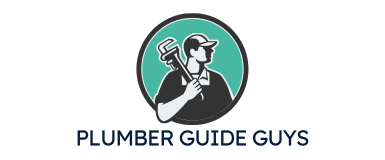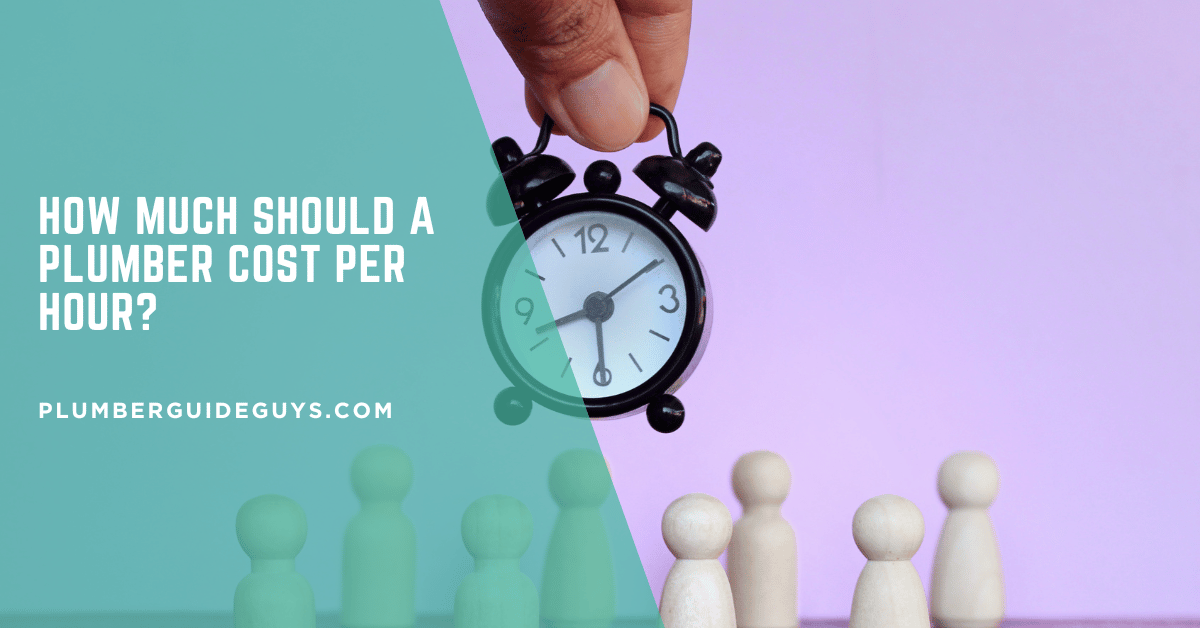Affiliate Disclosure
Plumber Guide Guys is a participant in the Amazon Services LLC Associates Program, an affiliate advertising program designed to provide a means for sites to earn advertising fees by advertising and linking to Amazon.
How Much Should a Plumber Cost Per Hour? Did you know the average American homeowner spends $175 to $450 on plumbing repairs yearly? Knowing plumber hourly rates helps you budget and avoid surprise costs when repairs happen.
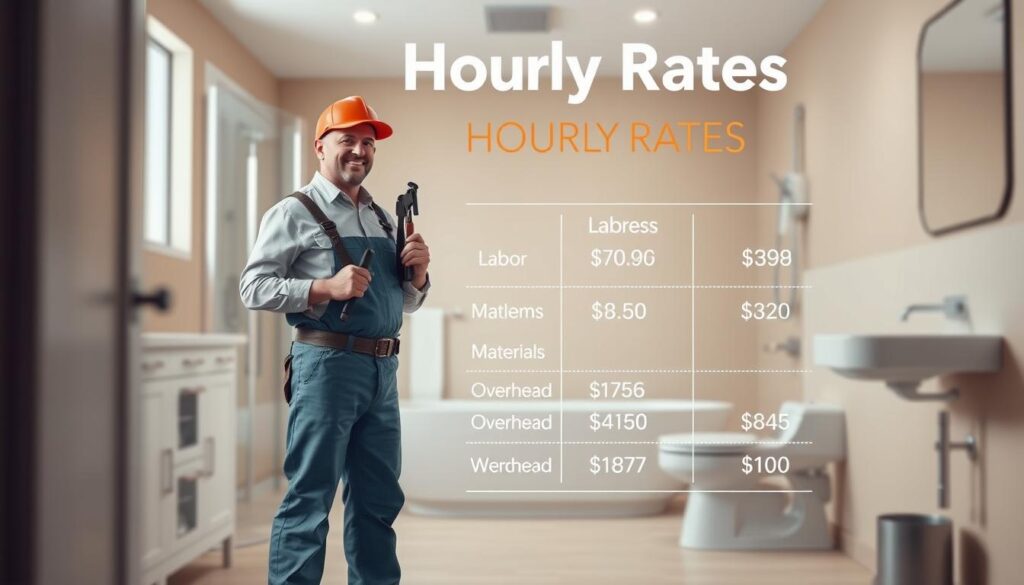
Several factors affect how much a plumber charges per hour. Rates change based on location, job complexity, and the plumber’s experience. Whether it’s a small leak or a big pipe job, understanding prices can save you money and stress.
Professional plumbers usually charge between $45 and $200 an hour. Most home services cost between $75 and $135. Your final cost depends on the service needed and where you live.
Key Takeaways
- Average plumber hourly rates range from $45 to $200
- Location significantly impacts plumbing service costs
- Emergency services often cost more than standard repairs
- Experience and certification influence pricing
- Always get multiple quotes before hiring a plumber
Table of Contents
Understanding Standard Plumbing Rates and Service Charges
Dealing with plumbing costs can be tricky for homeowners. Plumbers charge in different ways, not just by the hour. Knowing how they price their services helps you plan your budget better.
When you hire a plumber, you’ll see several cost parts. These parts help figure out the plumber’s average wage:
Basic Service Call Fees
Plumbers usually have a set fee for the first visit. This fee can be between $50-$200. It depends on where you live and the repair’s complexity.
- Diagnostic evaluation
- Initial inspection time
- Travel expenses
Minimum Hour Requirements
Plumbers have a rule for minimum hours to bill. This rule helps them get paid fairly. It also covers their basic costs.
| Service Type | Minimum Hours | Typical Rate Range |
|---|---|---|
| Minor Repairs | 1-2 hours | $75-$250 |
| Complex Installations | 3-4 hours | $225-$600 |
Trip and Equipment Charges
Plumbers also charge extra for special tools and travel. These fees help them offer top-notch service with the right tools.
- Specialized tool usage
- Vehicle maintenance
- Equipment depreciation
Knowing how plumbers price their work helps you budget better. It shows the full cost of hiring a professional plumber.
How Much Should a Plumber Cost Per Hour in Different Regions
Plumbing rates change a lot in the United States. They are influenced by local economy and market. Your plumber’s fee depends on several factors that differ by region.
Urban areas usually have higher rates than rural ones. This is because living costs and competition are higher in cities.
The cost of a plumber varies by location. Plumbers in big cities like New York or San Francisco charge more. But, smaller cities and rural areas might be cheaper. Comparing prices across regions can show you the range of costs.
- Northeast: Highest average rates ($120-$180 per hour)
- Midwest: Moderate pricing ($90-$140 per hour)
- Southern States: Most affordable rates ($80-$120 per hour)
- West Coast: Premium pricing ($130-$200 per hour)
Pro tip: Always ask for quotes from different plumbers. This way, you can see the prices in your area. Rates can also depend on the plumber’s experience and what they specialize in.
When planning for plumbing work, remember that local factors and demand affect the cost. Also, the plumber’s skills play a role. Do your research to find the best rates for your project in your area.
Factors Affecting Plumber Hourly Rates
Understanding the cost of plumbing services means knowing what affects the price. Not all plumbing jobs are the same. Several important factors decide how much you’ll pay for help.
When looking at plumber rates, consider several key factors. These elements shape the cost of services:
Experience and Professional Credentials
A plumber’s skill level greatly affects the cost. Those with more experience and certifications charge more. This is because they have deeper knowledge.
- Apprentice plumbers: Lower hourly rates
- Journeyman plumbers: Moderate pricing
- Master plumbers: Premium hourly rates
Job Complexity and Technical Demands
The complexity of your plumbing job affects the price. Simple fixes are cheaper. But, complex jobs need more time and skill.
“Not all plumbing jobs are created equal – complexity drives cost.” – Professional Plumbing Association
Service Timing Considerations
When you need plumbing services can change the cost. Emergency calls outside regular hours cost more. This includes nights, weekends, and holidays.
- Regular business hours: Standard rates
- After-hours service: 1.5-2x standard rates
- Holiday emergency calls: Potentially 3x standard rates
Knowing these factors helps you plan for plumbing costs. This way, you avoid unexpected expenses.
Emergency vs. Regular Hour Plumbing Rates
When a plumbing disaster happens outside normal hours, it can hit your wallet hard. Knowing the difference between regular and emergency rates helps you make smart choices when it counts.
Emergency plumbing services cost more. Plumbers charge extra for work done after hours. This is because they have to drop everything and work outside their usual time. These rates can be 1.5 to 3 times what you’d pay during the day.
“Not all plumbing issues require immediate emergency intervention. Knowing when to call can save you substantial money.”
Several things can affect how much you’ll pay for emergency plumbing:
- Time of day (nights, weekends, holidays)
- How serious the plumbing problem is
- How far the plumber has to travel
- How complex the fix is
To avoid high emergency costs, think about regular maintenance. Also, find quick fixes that can hold you over until the next business day.
| Service Type | Average Hourly Rate | Additional Charges |
|---|---|---|
| Regular Business Hours | $75 – $150 | Standard service call |
| Emergency/After Hours | $150 – $250 | 50-100% markup |
Get ready for plumbing emergencies by saving a trusted plumber’s number. Also, know where your main water shut-off valve is. Being prepared can help you handle plumbing surprises better.
Comparing Flat Rate vs. Hourly Rate Pricing
When looking for plumbing services, you’ll find two main pricing types: flat rate and hourly rate. Knowing about these can help you choose wisely for your plumbing needs and budget.
Plumber hourly rates and flat rate pricing have their own benefits. These can affect the cost of your plumbing work. Let’s look at the main differences between these two pricing methods.
Understanding Flat Rate Pricing
Flat rate pricing has many perks for homeowners who want clear costs:
- Transparent total cost before work starts
- No surprise charges or unexpected fees
- Clear service and materials breakdown
- Simplified billing process
Advantages of Hourly Rate Structures
Hourly rate pricing has its own benefits for specific plumbing tasks:
- More flexible for complex or unpredictable jobs
- Better for ongoing or extensive repair projects
- Allows detailed tracking of work performed
- Potential cost savings for smaller, quick repairs
When choosing plumbing services, think about your project’s needs. Some jobs fit better with flat rates, while others work better with hourly billing.
Pro tip: Always request a detailed estimate and discuss the pricing structure before starting any plumbing work.
The best pricing model depends on your plumbing needs, project complexity, and how you feel about cost changes.
Common Plumbing Services and Their Average Costs
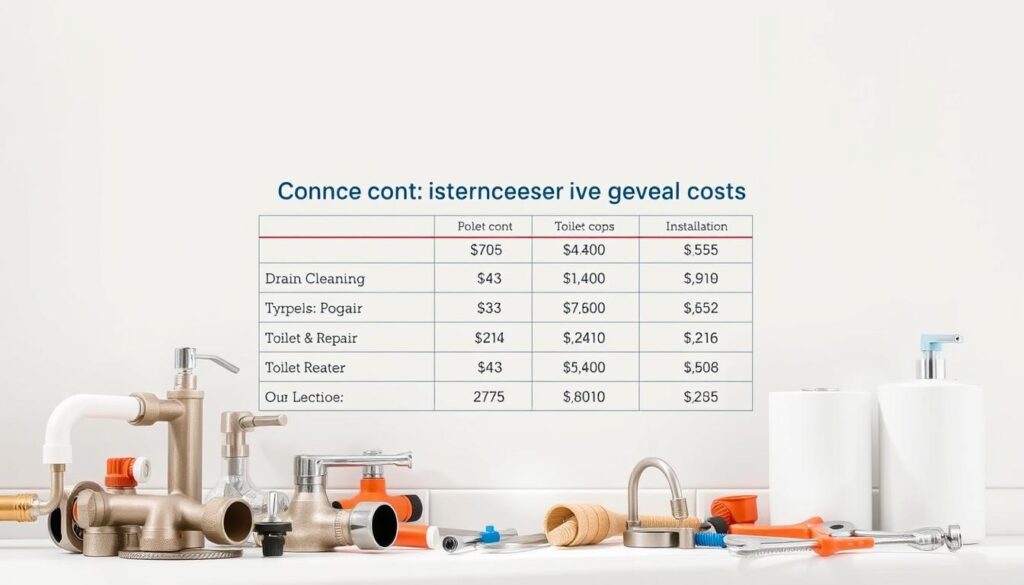
Understanding professional plumbing costs is key to budgeting for home upkeep. Different plumbing services have varying prices based on complexity and time needed. Knowing the hourly rate can help avoid unexpected costs.
Here are the most common plumbing services homeowners face:
- Leak Repairs: $150 – $350
- Drain Cleaning: $100 – $275
- Toilet Repairs: $100 – $250
- Faucet Replacements: $200 – $500
- Water Heater Services: $250 – $750
The cost of plumbing services can change based on several factors:
| Service Type | Typical Hourly Rate | Average Total Cost |
|---|---|---|
| Minor Repairs | $75 – $125 | $150 – $400 |
| Major Installations | $125 – $250 | $500 – $1,500 |
| Emergency Services | $150 – $300 | $300 – $1,000 |
Pro tip: Always request detailed quotes and compare prices from multiple licensed plumbers in your area to ensure fair pricing.
“Knowing the typical costs helps you make informed decisions about your home’s plumbing needs.” – Professional Plumbing Association
Understanding Additional Costs Beyond Hourly Rates
When you hire a plumber, your bill is more than just the hourly rate. Local plumbers charge extra for several things that can raise the final cost.
Knowing about these extra costs helps you plan better. This way, you can avoid any surprise expenses. Plumbing services often have extra costs beyond the hourly rate.
Material Costs and Markups
Plumbers charge for the materials they use. This includes:
- Pipes and fittings
- Replacement parts
- Specialized equipment
- Consumable supplies
These costs usually have a markup. This markup is for buying, moving, and managing the materials. It’s usually 10% to 30% of the material’s cost.
Equipment Fees
Some plumbing jobs need special tools and equipment. Your bill might include:
- Diagnostic tool usage
- Specialized machinery rental
- Advanced technological equipment
Travel Expenses
Travel costs are also part of local plumber fees. These include:
- Fuel consumption
- Vehicle maintenance
- Time spent traveling to your location
Pro tip: Always ask for a detailed breakdown of extra charges. This way, you’ll know your total plumbing service cost.
Professional Plumbers vs. Handyman Services: Cost Comparison
When plumbing problems arise, you might think about hiring a professional plumber or a handyman. Knowing the cost differences can help you choose wisely. This choice should balance quality and your budget.
Professional plumbers have skills that go beyond simple fixes. Even though their rates might be higher, they offer big benefits:
- Comprehensive licensing and certification
- Advanced technical training
- Comprehensive insurance coverage
- Guaranteed workmanship
Handyman services are cheaper but have big limits. They can do simple jobs like unclogging drains or replacing faucets. But, for complex plumbing issues, you need a pro.
“Not all plumbing problems are created equal. Choosing the right professional can save you money in the long run.”
Here are some situations where you really need a professional plumber:
- Pipe replacements
- Sewer line repairs
- Water heater installations
- Complex bathroom renovations
Even though handyman rates might look good, professional plumbers offer more. They give you peace of mind with expert solutions and warranty protection. Your home’s plumbing needs the care of a pro to avoid expensive repairs later.
Ways to Reduce Your Plumbing Costs
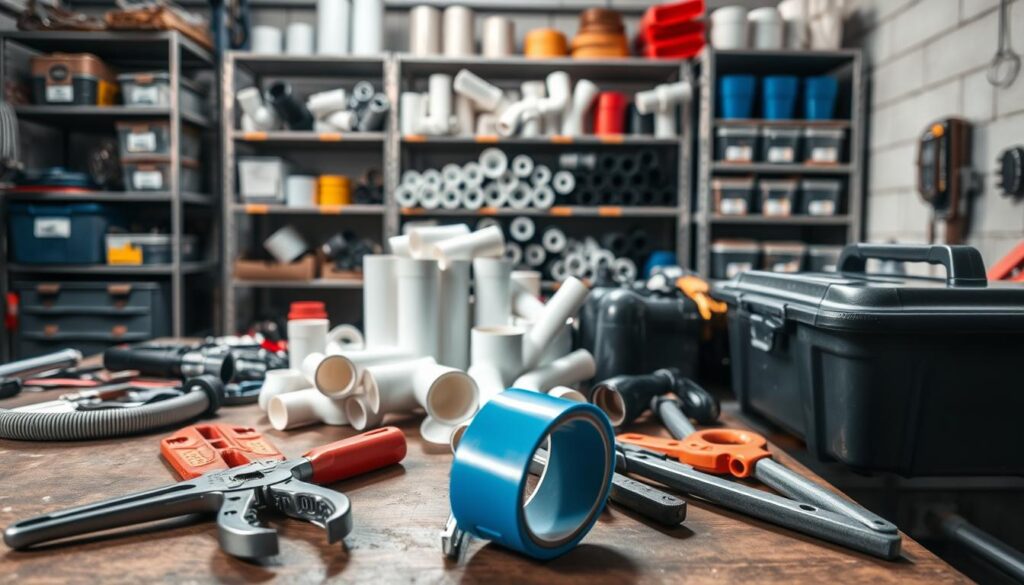
Managing plumbing costs doesn’t mean you have to cut corners. Smart homeowners can lower their plumbing bills by using smart strategies. These strategies protect both your pipes and your wallet.
Preventative maintenance is key to controlling plumbing costs. Regular checks can spot problems early. This way, you avoid expensive repairs later on.
- Schedule annual plumbing check-ups
- Fix minor leaks immediately
- Install water-efficient fixtures
- Learn basic DIY maintenance skills
When you hire plumbers, clear communication is important. Tell them the problem, give all the details, and ask for clear prices. This helps avoid surprise costs and ensures fair prices.
Here are some ways to save:
- Bundle multiple repairs to cut down on service call fees
- Ask for detailed written estimates
- Compare prices from different plumbers
- Choose quality materials for long-term savings
Being proactive and informed helps you manage plumbing costs. You can do this without sacrificing quality service.
When to Choose Hourly vs. Flat Rate Services
Choosing the right pricing model for plumbing services is key to saving money and being happy with your project. Knowing when to pick plumber hourly rates or flat rate pricing is important. It helps you make choices that are fair and cost-effective.
Every plumbing project is different. Your choice depends on how complex the project is, how long it will take, and if there might be unexpected problems.
Projects Best Suited for Hourly Rates
- Complex diagnostic work requiring extensive troubleshooting
- Renovation projects with uncertain scope
- Custom installations with variable requirements
- Emergency repairs where total time cannot be predetermined
When Flat Rate Pricing Makes Sense
- Standard repair jobs with predictable outcomes
- Straightforward installations
- Routine maintenance tasks
- Replacement of specific fixtures or components
Professional plumbers recommend evaluating each project’s unique characteristics before selecting a pricing structure.
“The right pricing model can save you money and prevent unexpected expenses.”
Talk to your plumber about your project’s details to find the best pricing. This way, you can understand the costs and make a choice that fits your budget.
What Qualifies as Fair Pricing for Plumbing Services
Finding fair prices for plumbing services means looking at more than just cost. It’s about getting good value for what you pay. The plumber’s skill and experience play a big role in setting prices.
When looking at plumbing prices, think about these important points:
- How complex the plumbing job is
- The plumber’s professional certification
- Where you live and local prices
- The special tools needed for the job
- How urgent the service is
It’s key to have clear pricing. A good plumbing service will give you a detailed estimate. Typical hourly rates range between $45 and $200, based on where you are and the plumber’s skill.
| Service Level | Typical Hourly Rate | Complexity |
|---|---|---|
| Apprentice Plumber | $45 – $75 | Basic Tasks |
| Journeyman Plumber | $75 – $125 | Intermediate Work |
| Master Plumber | $125 – $200 | Complex Projects |
Fair pricing isn’t just about the cost. Look for plumbers who offer great service, stand behind their work, and are reliable. You want a plumber who gives you quality service, not just the cheapest price.
Conclusion
Knowing how much a plumber costs per hour is key for homeowners. Plumbing rates depend on many things like where you live, the service needed, and the plumber’s skill. This helps you choose services that are both good and affordable.
Plumbers in the U.S. charge different rates based on their experience and your project’s needs. It’s smart to look up local prices, get quotes from several plumbers, and think about the value of their work. Even if a plumber charges more, they might save you money by fixing problems before they get worse.
When you’re looking for a plumber, focus on their quality, reliability, and clear pricing. Ask for a detailed estimate and understand what work they’ll do. It’s also important to talk about costs before they start. Choosing skilled plumbers can help keep your home safe and save you money in the long run.
Knowing about plumber rates helps you make better choices. Take your time to compare services, check their credentials, and pick a plumber who offers good prices and quality work. With the tips from this guide, you’ll be ready to handle plumbing costs with confidence.
